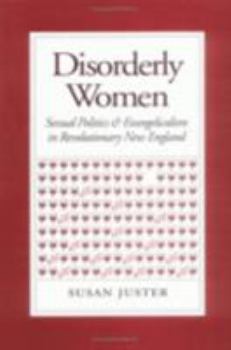Disorderly Women: Locals, Outsiders, and the Transformation of a French Fishing Town, 1823-2000
Select Format
Select Condition 
Book Overview
Throughout most of the eighteenth century and particularly during the religious revivals of the Great Awakening, evangelical women in colonial New England participated vigorously in major church decisions, from electing pastors to disciplining backsliding members. After the Revolutionary War, however, women were excluded from political life, not only in their churches but in the new republic as well. Reconstructing the history of this change, Susan...
Format:Paperback
Language:English
ISBN:0801483883
ISBN13:9780801483882
Release Date:October 1996
Publisher:Cornell University Press
Length:224 Pages
Weight:0.70 lbs.
Dimensions:0.7" x 6.0" x 9.0"
Age Range:18 years and up
Grade Range:Postsecondary and higher
Customer Reviews
1 rating
A Helpful Exploration of Primary Materials
Published by Thriftbooks.com User , 17 years ago
Through a series of well-researched arguments, Susan Juster, Professor of History at the University of Michigan, seeks to show in this monograph that the participation of evangelical churches in the revolutionary cause during the late 18th century had a profound impact upon the place that women were offered within those churches. During the pre-revolutionary era, Baptist and other evangelical churches became increasingly prominent parts of the New England religious landscape. The relative parity that women enjoyed with men in these congregations was a function of the liminality inherent in the intense religious experience that members of such congregations shared. The American revolution, along with a desire for increased respectability among Baptists, soon moved Baptist churches towards the mainstream of New England religious life. Juster argues that the rhetoric of the American revolution, with its identification of submission to authority as female, caused evangelical churches to reconsider sin as a gendered concept. Effects of this reconsideration can be found, for instance, in evangelical conversion narratives, which for the first time after the revolution can be identified with the gender of the writer through the language used for deity and sin, indicating that men and women after the revolution had begun to think of their relationship to God and themselves in very different ways. Juster comes to her conclusions through the application of feminist theories borrowed from other scholars to the material that she has gathered on the revolutionary-era evangelical churches of New England. Her conclusions about the shifting use of gender language and the sinking status of women within these churches during and after the revolution are convincing, although her use of theory is occasionally somewhat essentialistic. Juster sometimes lifts theoretical concepts from studies of other historical situations and places them over her own subject without offering an explanation as to how the given theory or idea remains applicable. At no point, however, does Juster's use of theory squeeze her subjects into a mold so tight that her conclusions are entirely the results of her method and not the content of her sources. Perhaps the most impressive aspect of Juster's work is the breadth of her research. To gather enough discipline records and conversion narratives to come to a representative conclusion, the author canvassed denominational historical societies, government archives and university library special collections. As a result, Juster's work is unlikely to be criticized for drawing a conclusion which does not reflect the scope of research claimed in title of her text. This work serves two purposes: It paints an excellent portrait of colonial evangelicalism in New England, and then shows with a good deal of persuasiveness how these churches were eventually altered by the revolutionary climate and the churches' subsequent need for respectability.






